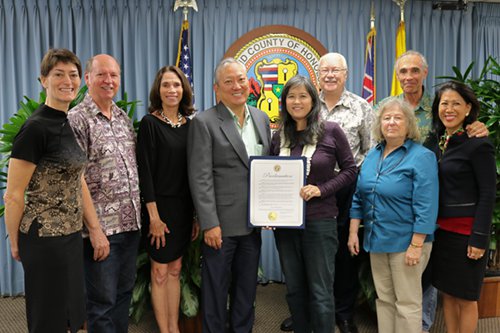Conflict Resolution Day – October 20, 2016
Posted on Oct 19, 2016 in Featured News
Governor David Ige presents a proclamation declaring October 20, 2016 to be Conflict Resolution Day. Pictured from left to right: Bruce McEwan, Mediation Center of the Pacific President; Lisa Nakao, Better Business Bureau of Hawaii Director of Operations; Tricia Morris, Association for Conflict Resolution, Hawai’i Board of Directors; Maya Soetoro-Ng, Matsunaga Institute for Peace and Conflict Resolution, Public Policy Center, UH Manoa Director of Outreach and International Partnerships; Governor David Ige; Tracey Wiltgen, Mediation Center of the Pacific Executive Director and Mediation Centers of Hawai’i Contract Administrator; Lisa Jacobs, Association for Conflict Resolution, Hawaii President; Cecelia Chang, Hawai’i State Judiciary Center for Alternative Dispute Resolution Director; Lynn Murrison, Association for Conflict Resolution, Hawaii Board of Directors and Honolulu Board of Realtors (arbitration, mediation); Anne Marie Smoke, Association for Conflict Resolution, Hawai’i Board of Directors and Hawai’i State Judiciary Center for Alternative Dispute Resolution Appellate Mediation Program Administrator.
Governor David Ige, Honolulu Mayor Kirk Caldwell and the Honolulu City Council proclaimed October 20, 2016 to be “Conflict Resolution Day.” Each of the proclamations encourages us to learn more about conflict resolution practices and apply those practices in our daily lives to promote peaceful and creative resolutions to disputes.

City & County of Honolulu Managing Director Roy Amemiya, Jr. presents Mayor Kirk Caldwell’s proclamation declaring October 20, 2016 to be Conflict Resolution Day. Pictured from left to right: Anne Marie Smoke, Hawaii State Judiciary Center for Alternative Dispute Resolution Appellate Mediation Program Administrator; Bruce McEwan, Mediation Center of the Pacific President; Tracey Wiltgen, Mediation Center of the Pacific Executive Director and Mediation Centers of Hawai’i Contract Administrator; Roy Amemiya, Jr., City and County of Honolulu Managing Director; Lisa Jacobs, Association for Conflict Resolution, Hawaii President, and Hawaii State Bar Association Conflict Resolution Section Co-chair; Dick Mosher, Association for Conflict Resolution, Hawaii Board of Directors and Hawaii State Bar Association Alternative Dispute Resolution Section Co-chair; Lynn Murrison, Association for Conflict Resolution, Hawaii Board of Directors and Honolulu Board of Realtors (arbitration, mediation); Tom DiGrazia, Association for Conflict Resolution Board of Directors, Richardson School of Law; and Cecelia Chang, Hawaii State Judiciary Center for Alternative Dispute Resolution Director.
There are many types of alternative dispute resolution (ADR) processes including mediation, facilitation, arbitration, and even coaching. The processes are an “alternative” to litigation, and other lengthy, resource- and morale-draining processes. ADR involves a “neutral” who helps guide the parties to resolve part or all of a dispute voluntarily, informally, and confidentially. Unlike litigation, where decision-making rests in the hands of a judge and jury, ADR processes give disputing parties control over the terms of the agreement reached.
“Mediation allows parties to resolve their dispute without the formality, costs, and stress that may arise with litigation,” said Cecelia Chang, Director of the Hawaii State Judiciary’s Center for Alternative Dispute Resolution (CADR). “It’s a win-win as it also helps cut the time it takes for both the courts and the parties to come to a resolution.”
The Hawaii State Judiciary and the Mediation Centers of Hawaii (MCH) provide free, on-site mediation services at the court for all small claims and residential landlord-tenant cases statewide. In the past fiscal year, the Judiciary has served more than 7,760 people.
“We thank our community mediation centers for all they do to support our mission,” continued Chang. “The community mediation centers that make up the MCH do a remarkable job recruiting and training mediators to meet the demand for mediation in court cases. A terrific example is The Mediation Center of the Pacific (MCP) Adopt-A-Court pilot program operating in the District Courts.”
Please visit CADR’s website to learn more and read their latest edition of ADR Times.
